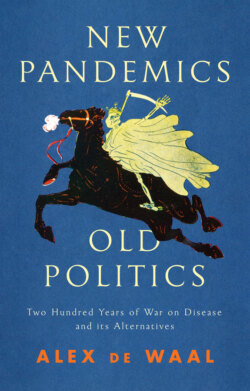Читать книгу New Pandemics, Old Politics - Alex de Waal - Страница 7
1 Following the Science, Following the Script
ОглавлениеA pandemic pathogen is scary and strange. It is new to medical science and society and it is everywhere. At the critical early moment of a pandemic, much of the advice of doctors and epidemiologists will be vague and some will be wrong. Those who know their subject best will have the deepest uncertainties. No expert can say when and how the pandemic will end. There isn’t even an agreed definition of ‘pandemic’ – an arcane but revealing absence.
Public leaders pay homage to ‘following the science’ but they actually follow a script. It’s a storyline with a reassuring ending. It goes something like this:
We are at war against an invisible enemy. While our doctors and nurses combat the disease at the frontline in hospitals, while our scientists seek the cures and vaccines in their laboratories, the population must make sacrifices on the home front. We should trust our government while we forgo liberties and livelihoods. The pandemic will end with a medical magic bullet that vanquishes the pathogen. Then we will return to our way of life and be safe.
This is the basic outline of a war story. It’s also a tale of conquest of the microbial world and a charter for emergency rule that sets aside human rights and civil liberties. ‘War on disease’ is not a harmless metaphor. It suppresses critical thinking. It focuses our worries on a singular germ as our enemy, forgetting about other things – such as devastated ecologies and an inequitable society – that are no less pathogenic. And its comforting ending is false – even if the discovery of a vaccine or therapy means that leaders feel entitled to declare ‘victory’.
This book is about this gargantuan and harmful error. It is about how and why the ‘war on disease’ script was written and how it guides our thinking and shapes our institutions in ways that we may not realize. When we most need a narrative to make sense of a devastating pandemic, the ‘war on disease’ not only fails, but also stops us recognizing our failures. This book is also about some very different visions. Scientists, social activists, and public health experts have other analyses and narratives – rigorous, practical, democratic, holistic – that we should pursue. The Covid-19 pandemic and crisis is showing us that the ‘war on disease’ is at best humdrum and at worst dangerous, and that these alternatives are urgent.
The ‘war on disease’ script is like the sheaf of documents in a desk drawer seldom opened. It consists of a handful of different scripts, pictures, and reminders. Some are Chinese, most are European or American. Also in the drawer are other images for disease outbreaks: a journey, an imbalance in the cosmos, a crime investigation, a storm, and a forest fire.1
In an emergency, we think fast and intuitively. To change the metaphor, being caught by a pandemic is like being caught in a storm when hiking in the mountains: suddenly the clouds roll in, darkness descends, rain lashes down, and the stones become slippery. We can’t stay where we are, and we can’t wait for the storm to clear to look around and find the best way down – we want to find a way to safety right away. There’s a handrail: we grasp onto it because it keeps us steady. This handrail is our intuition, built from metaphors, storylines, images, and memories of what worked in the past. It’s more than just a thesaurus, it’s actually how we think – and so it usually goes unexamined. In the moment of greatest turmoil, fear, and uncertainty, it’s reassuring. The handrail makes each step feel safe, and we assure ourselves that we can look at the map later on. That map will show us some other directions we might have taken, had we stopped to orient ourselves more carefully. We may regret that we didn’t pause for a few moments to consider those other paths.
